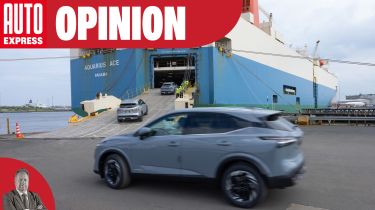Trump’s tariff threats spell trouble for global car-makers
Andy Palmer believes a trade war is the last thing the car industry needs with protectionism likely to stifle innovation

The prospect of new tariffs imposed by President Trump on Canadian, Mexican, Chinese and European imports has rattled governments and industries around the globe – and nowhere are the alarm bells ringing louder than in the automotive sector.
As someone who has spent decades in the industry, both in Japan and the UK, I’ve seen firsthand how global collaboration and open trade have fostered the innovation that has propelled cars to be safer, greener and more affordable than ever before. Protectionism, as threatened by the Trump administration, only serves to make our industry lazier, less innovative, and more inward looking. Ultimately, the knock-on effects of tit-for-tat tariffs are likely to cause havoc with inflation, cost of living, and consumer choice – something no one can afford to ignore.
Among the most exposed to these headwinds is Germany’s venerable car industry, a pillar of Europe’s largest economy and a key component of their national identity. In many ways, the timing of these tariff threats could not be worse. The likes of Volkswagen, BMW, Audi and Mercedes are already wrestling with competitive pressure from Chinese manufacturers – China having swiftly transitioned from importer to the world’s largest exporter – and stringent EU emission targets that require costly electric car development. A trade war with the US could plunge these companies deeper into crisis.
German automakers depend on international sales for survival, with nearly one-third of their global revenues tied to China alone. Now, the US could impose a 25 per cent levy on EU car imports, undercutting another critical market. According to some estimates, German production might tumble by 5 per cent in a trade-war scenario and that at a time when Chinese competition is intensifying, European demand for new cars remains subdued, and the impacts of the Russia–Ukraine conflict still impair sales prospects.
VW, BMW and other German brands can try to redirect their exports or ramp up production inside the US. However, overnight shifts in manufacturing footprints are costly, time-consuming, and fraught with risk, especially when the global economy is teetering. Short-term quick fixes – such as surging shipments of cars and components across the Atlantic before any tariffs bite – are also a gamble. Given the speed and volatility of Trump’s moves, that window could slam shut without warning.
Regardless of what the President may have indicated on the campaign trail, tariffs are not a magic cure for reviving manufacturing in America’s Rust Belt, a region that has often been the focus of Trump’s trade battles. Building new factories to replace European or other imported vehicles cannot happen at the flick of a switch. Let us also not forget that retaliatory measures from trading partners on whom tariffs are imposed are usually only a matter of time. This no-holds-barred environment may push up prices for components and raw materials, ratchet up inflation, and shrink consumer choice. American buyers, who often favour German luxury marques, could soon find that their Mercedes or BMW costs thousands of dollars more, or is simply no longer on offer.
At a more fundamental level, imposing punitive measures on foreign-made vehicles invites the worst sort of complacency in domestic manufacturers. Historically, open markets have driven automotive innovation, spurring designers to create safer, more fuel-efficient and cutting-edge cars. If overseas competition is effectively taxed out of contention, it’s all too easy for local automakers to rest on their laurels. And if the US, EU, and other major blocs slide into tit-for-tat tariff exchanges, the incentive to invest in new technologies – particularly EV drivetrains, battery research, and software integration – diminishes across the board.
There are, of course, ways to adapt. European automakers can accelerate their moves to localise manufacturing inside the US to avoid tariffs, increasing their reliance on American workers and suppliers. Some may seek out alternative regions beyond China and the US, forging deeper relationships with other free-trade nations. Still, there is no quick fix. Building a new plant, training a workforce, and securing reliable component supply can take years, if not decades. During that time, the industry’s shift to electric mobility risks forging ahead unevenly, with those not able to afford the investment trailing behind.
Policymakers, particularly in Germany, are hinting at more generous EV subsidies and stronger “Made in the EU” incentives but let us not gloss over the contradiction: these measures may be just another step towards protectionism. In truth, the entire automotive industry, including governments that benefit from it, has long thrived on open trade. Rolling back the clock undermines those benefits and threatens the very basis of what has been a success story in global industrial cooperation.
History teaches us that durable growth for any major manufacturing industry stems from cooperation, not segregation. Notwithstanding concerns over national security or strategic industries, the auto sector has historically flourished through cross-border partnerships and unhampered trade routes.
My plea, as someone who has led multiple carmakers through times of global upheaval, is for cooler heads in Washington, Beijing, Brussels and beyond. We need constructive dialogue, not further rhetorical escalation. Both sides must seek a pragmatic resolution that acknowledges the modern automotive supply chain is fundamentally multinational – from factories in Mexico to R&D centres in Germany, design studios in California, and battery plants in Asia.
Cars have always been emotional objects, symbols of freedom and progress. Let us ensure they remain a force for innovation – not the casualties of a global trade war that nobody truly wins. Unless a viable compromise is found soon, the consequences for the automotive industry, and indeed consumers worldwide, may be painful and lasting.
Do you agree with Andy? Let us know your thoughts in the comments section...
Find a car with the experts




